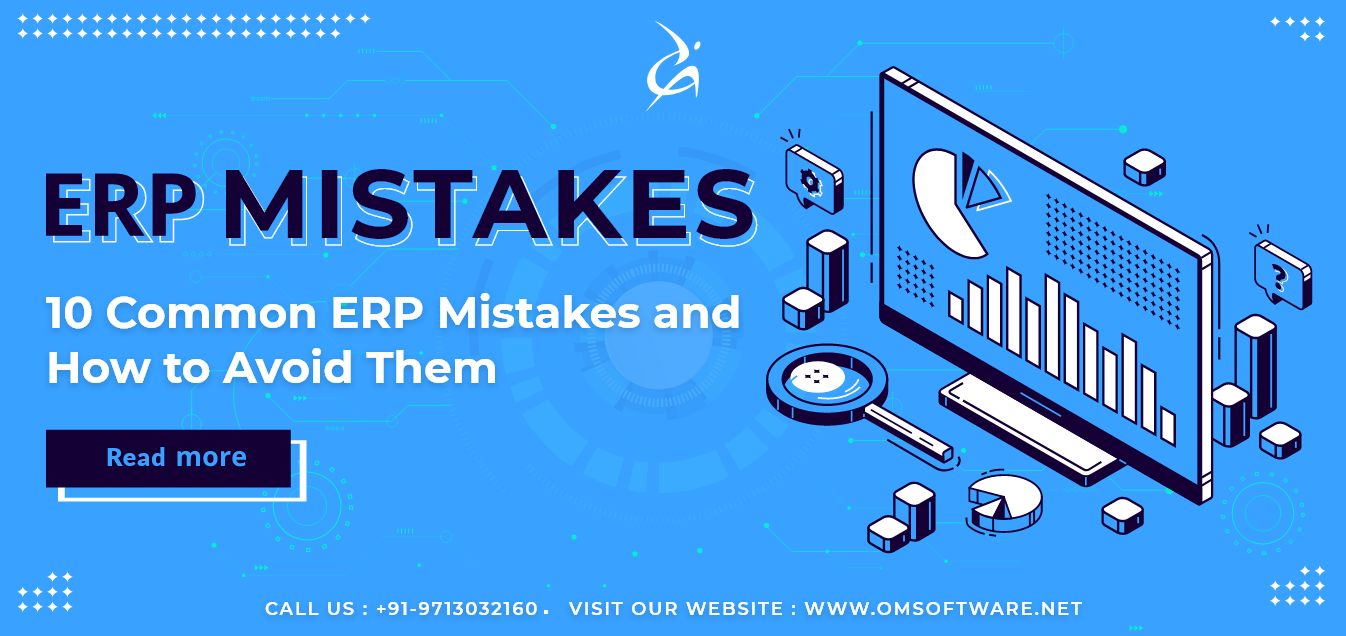By OMSOFTWARE - Web & Mobile App Development Company | Pune
Jul 30 , 2021
10 Common Mistakes You Should Avoid
Before you use ERP, learn some of the important considerations in relation to this. It can be highly advantageous for the organization and helps in streamlining the workflows. However, please be aware of error-prone solutions. They can ruin the whole idea. To prevent the occurrences of any disaster, go through the 10 common mistakes. Avoid them by all means for obtaining productive output.
-
Unrealistic Goals
You must plan before introducing anything new to your enterprise. Otherwise, the hidden objective can never be successful. In most cases, the organizations fail to recognize the importance of ERP solutions. As a result, they face so many bottlenecks in the subsequent phases. Moreover, collaborating with an expert third-party organization. This will let you deploy the product appropriately. Always have realistic goals and approaches as you go for ERP.
-
Less Collaborative Work
Any ERP solution needs full support from your employees. Therefore, if they are unable to work collaboratively, it will lead to multiple issues. Hence, always encourage joint efforts from your team. It will undoubtedly help the project managers to complete the project on time.
-
Not Giving Training
It is important to train your employees well to operate the new system. Some think that the employees can automatically adapt to the new technique. However, it is not possible practically. The software packages include several complex solutions. Therefore, it requires some special skills to carry out the functions effectively. Hence, provide live demos to all the employees to make the concept clear. Also, let them practice for some days to understand the new software. Slow and gradual transformation is recommendable.
-
Lack Of Load Testing
Active load testing plays a significant role in utilizing ERP solutions. With the help of such tests, you can verify the effectiveness of the software in real-world circumstances. You can set up a separate in-house testing team for this purpose. Alternatively, go for a third-party service provider for carrying out active load testing.
-
Using Poor Set Of Data
The ultimate output of any technical solution depends primarily on the input. Therefore, you have to pay attention to the data set you are using. Conduct a review of the inputs to identify any gap, if any. Utilize only the holistic sources to feed data into your system.
-
Absence Of Pilot Programs
For each stage involved in the implementation process, there are separate pilot programs. Therefore, do not neglect these essential programs. They allow the employees to utilize the sources optimally for required solutions.
-
Lack of Compliance
The ERP packages must be in line with the prescribed laws. Therefore, skipping of compliances can lead to several disputes with the Government. You can take help from various innovative tools with in-built compliance features. One such productive tool is IFS ERP.
-
Incorrect ERP
The ERP solution must match the required criteria for your business. Incorrect software can hamper the smooth functioning of your business. Selecting an ERP leader over the sub-par solutions can provide better results. Therefore, enjoy maximum benefits with the correct ERP implementation.
-
Legacy Systems Not Replaced
You must conduct periodical maintenance of the legacy systems. Sometimes, you may find it easier than the replacement. However, such maintenance can also be costly due to frequent updates. Hence, it is better to replace when the need arises to avoid overlapping.
-
Lack Of Proper Strategy
Your job is not over yet even after the successful implementation of the ERP package. Continuous improvement is highly essential for quality results. Let the software run optimally for improved ROI. For that, you need to have suitable strategies.
Best Practices For Fruitful Results
Get rid of the probable risks by implementing the correct strategies to maintain ERP programs. Moreover, you have to be cautious about employee resistance. For successful implementation, you have to follow the best standards and practices. Know the relevant rules and regulations and go as per the plan.
Some of the best practices for ERP implementation are as follows;-
-
Make sure that the data is derived from authentic sources and is absolutely clean
-
Select the right team to carry out the important projects
-
Ensure that you give special training to the operators and provide full support
-
Collect feedback from the employees, third parties and customers, throughout the entire process
-
Frame a Change Management Plan to make the employees accept the new system easily
-
Choose the right partner for implementing the relevant ERP program.
-
Always have the KPIs in place
-
Have clarity about the goals and specific requirements
Conclusion
With ERP you can bring a boom to your enterprise. Moreover, with sophisticated and modern solutions, you will be able to deal with several complex issues. Therefore, you must be careful about the implementation techniques and the related challenges. If you can apply the relevant tips, the chances of errors will be less. ERP is there to simplify your business processes. Therefore, learn the correct way to apply the software fruitfully.
Furthermore, any error in the package will make you suffer a lot. Do you want to reduce this burden? Then try the advanced methods for a better implementation. You can also take the support from other expert organizations and outsource this task. Gradually, your business will surely touch the heights. Train the staff for a better future. Focus on your objective and plan the strategies according to the relevant ERP solutions. Ultimately, success is going to come after such hard work.
OMSOFTWARE can definitely help you build your own ERP.
